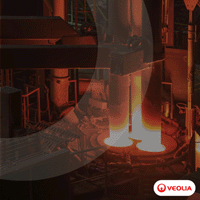Union Contract with U.S. Steel Expected; ArcelorMittal Contract Uncertain
08/29/2012 - With three days left to negotiate a new contract involving about 26,000 unionized workers at U.S. plants operated by U.S. Steel and ArcelorMittal, industry analysts say the most likely scenario is that the Pittsburgh steelmaker will make peace with the United Steelworkers union -- but ArcelorMittal may not.
With three days left to negotiate a new contract involving about 26,000 unionized workers at U.S. plants operated by U.S. Steel and ArcelorMittal, industry analysts say the most likely scenario is that the Pittsburgh steelmaker will make peace with the United Steelworkers union -- but ArcelorMittal may not.
"Everything I hear, which is mostly from the union side, is that they’re getting reasonably close at U.S. Steel but are not even in the ballpark with ArcelorMittal," said long-time industry analyst Charles Bradford.
On Tuesday, USW officials notified about 13,000 workers at ArcelorMittal that the Luxembourg company’s latest contract offer "is incomplete, inconsistent, and very dangerous." Among other things, it proposes a two-tier wage system that would involve new hires being paid lower wages, in some cases permanently, USW members were told.
Meanwhile, ArcelorMittal, the world’s largest steelmaker, confirmed Tuesday it is taking steps to shut down its furnaces and other equipment should a work stoppage occur.
Four-year contracts at both companies that were negotiated near the pinnacle of the industry’s high times in 2008 expire at 12:01 a.m. Saturday.
U.S. Steel’s 2008 agreement provided wage increases of $1 per hour in the first year and 4 percent in each of the next three years. It also provided a $6,000 signing bonus.
Shortly after the contracts were ratified, the surging steel industry was derailed by the financial collapse. Prices and demand fell through the floor, sparking a string of nine consecutive quarterly losses at U.S. Steel.
What little USW officials are saying publicly about the talks indicates that negotiations with U.S. Steel have been more productive than talks with ArcelorMittal, which is said to be seeking $28 an hour in wage and benefit concessions. The steel producer contends that the $75 per hour in wages, benefits and post-retirement costs that workers receive under the current contract make the company uncompetitive.
"I think the [Mittal] furnaces are going to be cold. Whether it’s a lockout or a strike, it doesn’t matter," said John C. Tumazos, a Holmdel, N.J., analyst. "It is not tenable to have $75-and-change employment costs. Around the world, people build new mills and pay their workers $20 and less per hour."
U.S. Steel declined to comment on the talks, which are taking place in Pittsburgh.
ArcelorMittal "remains optimistic about reaching a fair and equitable contract with the USW without a work stoppage," a spokesman said in an emailed statement.
One of the biggest issues is the cost of providing health and life insurance benefits to retirees, obligations that do not burden many of U.S. Steel’s and ArcelorMittal’s nonunion competitors. U.S. Steel supplies benefits to about 115,000 employees, retirees and their survivors. The plans that provide those benefits had a $2.7 billion deficit at the end of last year.
Mr. Tumazos estimated those liabilities could increase 20 percent by the end of the year -- excluding any increases caused by higher health care costs -- because of record low interest rates. The value of retiree pension and health care benefits is determined by interest rates. The lower the rate, the bigger the liability.
A dispute over retiree health care costs caused workers at Allegheny Technology’s Allegheny Ludlum unit to initially reject a contract offer in July 2011. They later ratified the contract, which requires retirees to pay $80 or $90 a month more in health insurance premiums.
Some Ludlum retirees filed a lawsuit over the increases in the U.S. District Court in Youngstown. The case was subsequently transferred to federal court, Downtown.
There are three possible outcomes for negotiations at both steel companies: A new contract could be negotiated by Saturday’s deadline; the current contract could expire with the union agreeing to work under the existing contract until a new one is negotiated; or work could stop because the union went on strike or the company locked out workers.
"My guess is ArcelorMittal would go for an extension," Mr. Bradford said, adding that there does not seem to be any big, insurmountable issue between the union and U.S. Steel.
Should U.S. Steel settle with the union first, ArcelorMittal would be under pressure to reach an agreement, he said.
"It would be very difficult for them to hold out for very much more than U.S. Steel got," Mr. Bradford said.
Mr. Tumazos is not so sure. He believes ArcelorMittal chairman, president and CEO Lakshmi Mittal, who owns 40 percent of the steelmaker’s stock, "is completely serious" about demanding $28 an hour in concessions. Consequently, U.S. Steel will be at a disadvantage if Mittal receives more generous concessions, Mr. Tumazos said.
Both steel producers have mills in Canada that could help fill any shortfall in supply should a labor dispute halt production at one or both companies, Mr. Bradford said. While he does not think demand is that bad, prices remain low because there is too much supply. Mr. Bradford does not see the soft conditions ending any time soon.
"The near term outlook is pretty gruesome," he said.



.png?lang=en-US&ext=.png)






